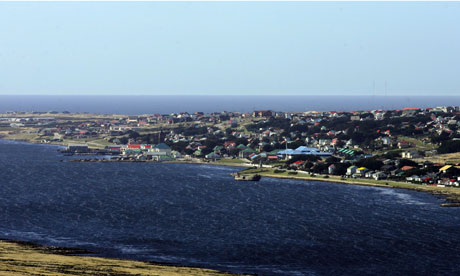
The Falkland Islands have been much in the news of late, and we are extremely grateful for the strong support we have and are receiving from the people and the government of the UK. However, among the informed commentary, there are misperceptions being perpetuated by people taking it upon themselves to publicly comment on a people and a place they have never visited, and clearly know little about. We would encourage everyone, actors, musicians or otherwise, to come and visit our home in order that they can properly appreciate a matter that frequently gets overlooked – the unassailable right of a people to determine their own future, in their own home.
I would like to take this opportunity to correct some common myths about our history. First, the Falkland Islands had no indigenous population prior to their settlement by our ancestors – the islands were unoccupied. Argentina claims the Falkland Islands form part of the province of Tierra del Fuego – an area that was not claimed as a part of the Republic of Argentina until after two generations of Falkland Islanders had been born and raised.
There is no truth to Argentine claims that a civilian population was expelled by Britain in 1833. The people expelled were an illegal Argentine military garrison, who had arrived three months earlier. The civilian population of the islands, who had sought permission from Britain to live there, were invited to stay. All but two of them, with their partners, did so.
We are not an implanted population. Our community has been formed through voluntary immigration and settlement over the course of nearly 200 years. We are a diverse society, with people from around the world having made the islands their home.
The UN charter enshrines the right of all people to determine their own future, a principal known as self-determination. It is in exercising this right that we have chosen to retain our links with the UK. This fundamental right is being ignored by the Argentinian government, which is denying our right to exist as a people, and denying our right to live in our home.
We are not a colony of the United Kingdom; we are a British overseas territory by choice, which is something entirely different. We are not governed by Britain, but are entirely self-governing, except for defence and foreign affairs. We democratically elect our legislative assembly members – they are chosen by the people of the Falkland Islands to represent them and to determine and administer our own policies and legislation.
We are economically self-sufficient, except for the cost of defence – for which there would be no need were it not for the claim made by an aggressive neighbour. Through our own efforts, our economy allows us to enjoy excellent health services and education provision, with Falkland Islanders studying for their A-levels and degrees overseas, paid for by the Falkland Islands government. It is testament to the strong bond our young people have with their home that nearly all return on completion of their studies.
The Argentinian government is claiming that the UK is exploiting the natural resources of the region; an absurd claim on a number of fronts. First, we manage our own resources. Our farming practices are largely organic, our ecotourism industry is famous across the world, our fisheries are internationally acclaimed for their responsible management and sustainability, and our developing oil industry is managed by our government and regulated to a minimum of UK North Sea standards. Our environment is very much our home, and as such we value and protect it.
While the Argentinian government's calls for negotiations with the UK may seem benign, and a rational way to end the dispute, it should be noted that the Argentine constitution requires the outcome of negotiations to be nothing but full Argentine sovereignty over our home. As far as we are concerned, sovereignty is not up for discussion. On all other fronts, we want nothing more than to have a relationship of co-operation for mutual benefit, with Argentina and all of our neighbours. This has proved impossible. In 1995, we entered a joint agreement with Argentina over hydrocarbons exploration: in 2007 the Argentinian government tore this up. In 1999, the Falkland Islands signed a joint agreement with Argentina to co-operate in a number of areas, including sharing of information on joint fish stocks. Only the Falkland Islands has upheld its side of this agreement; the Argentinian government has reneged on nearly every point.
More recent actions, such as attempts to ban our ships from entering South American ports; decree 256, which denies passage of vessels transiting Argentine waters; the banning of charter flights in support of our tourism industry; laws taking sanctions against companies involved in peaceful commerce in both countries, all point to a desire by Argentina to frustrate our international trade and attempt to isolate us.
The Falkland Islanders are a peaceful, hard-working and resilient people. Our society is thriving and forward-looking. All we ask is to be left in peace to choose our own future, and responsibly develop our home for our children and generations to come. We would ask, particularly of those who take it upon themselves to comment from a standpoint of ignorance on our future, that our rights, and our points of view, and above all our wishes are respected and considered as enshrined in the UN charter.
• Follow Comment is free on Twitter @commentisfree

